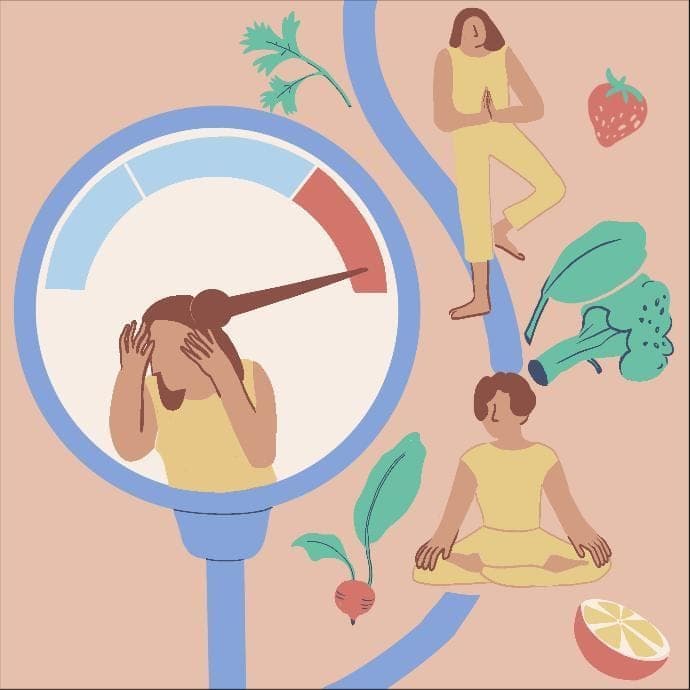High blood pressure or hypertension is a long term medical condition and one of the leading causes of premature deaths worldwide. This deadly condition shows little or no symptoms and is a common risk factor for cardiac arrest, stroke and kidney failure. It is no surprise that in the current times, the leading causes of hypertension are unhealthy lifestyle and poor diet habits.
What is blood pressure?
To understand high blood pressure, we first need to define blood pressure. Blood pressure is the force of blood exerted on the walls of your arteries (blood vessels) when the heart pumps blood in your body.
Blood pressure reading involves two types of measurements.
- Systolic blood pressure: The first or top number is the measure of the blood pressure when your heart is beating.
- Diastolic blood pressure: The second or bottom number is the measure of the blood pressure in between the beats when your heart is at rest.
The normal blood pressure is 120/80 mm Hg, where systolic is 120, diastolic is 80.
What is hypertension or high blood pressure?
You have high blood pressure or hypertension when the force exerted on your blood vessels is higher than the usual readings. There are two types of hypertension.
- Primary Hypertension: Primary hypertension, also known as Essential hypertension is the most common type, observed in 95% of cases whose cause is unknown.
- Secondary Hypertension: Secondary hypertension or Malignant hypertension contributing to only 5% of the hypertension cases, is caused due to other problems like kidney/ renal diseases, endocrine diseases; pregnancy or usage of certain drugs.
At what age does hypertension occur?
Although hypertension is more common among older adults, still every other age group people must go for regular screening every three years to decrease the risk of deaths.
What are the symptoms of hypertension?
Usually, there are no specific signs of high blood pressure, making regular screening a vital task.
In severe cases, you may notice some of these high BP symptoms:
- Headache
- Nausea
- Anxiety
- Lethargy
- Sweating
What are the causes of hypertension?
Old age: People above 60 years of age are at a higher risk of getting hypertension.
Inborn Conditions: Down's syndrome, Cushing's syndrome
Genes: People with a family history of high cholesterol and hypertension increases their chances of getting affected with it as well.
Medical conditions: Some medical conditions that affect your kidneys and some hormonal disorders also cause high blood pressure.
Lifestyle and diet habits: Since most jobs are desk jobs, people sit in one place for long hours and consume unhealthy fast foods, alcohol, sugary drinks, coffee, tea and smoke to relieve their stress. Work pressure or prolonged use of electronic gadgets can disrupt the sleep routine and increase the stress levels. All of this together causes high blood pressure.
Some medicines may also cause your blood pressure to rise , for instance medicines such as -
- Steroids - taken during long standing diseases
- Birth control pills
- Pain killers
- Herbal remedies that contain liquorice
- Antidepressants like Venlafaxines
Women, in particular may also experience hypertension due to pregnancy, postpartum depression and menopause apart from the above mentioned common causes.
What are the treatments of hypertension?
One needs to first confirm if they are hypertensive with their doctor. Once your doctor finds no other health risk, they can help you find the right method to control your blood pressure based on your age and some other risk factors, if any. Most commonly the following methods help -
Antihypertensive medication: Figure out what medicine works best for you with your doctor’s support and advice.
These three are equally important whether or not you are on medication!
- Lifestyle modifications
- Dietary changes
- Physical exercises
Lifestyle and diet changes to manage hypertension
If you are suffering from hypertension, it is about time you change your lifestyle. Below is an extensive list of lifestyle changes for high blood pressure that can be adopted for better health.
Consume a healthy diet
As far as possible, you must consume home-cooked fresh food and include all green vegetables, fruits, low-fat dairy and lean fish in your diet. It will help you in maintaining a healthy body weight and keep your blood pressure under control.
Eat less sodium
If you eat excess salt, your body has to retain more water to clear the salt. It can put pressure on your heart and blood vessels, thus increasing your blood pressure. Therefore, it is good to avoid junk foods, fast foods and packaged foods that have high sodium content.
Reduce your sugar intake
Sugary drinks and sweets also contribute to weight gain. Replace your sugary sodas with natural fruit juices and sweets with fruits, dates and nuts.
Maintain a healthy body weight
If you are overweight or obese, your bad cholesterol levels increase which is harmful to the heart as the cholesterol plaque deposits in the blood vessels. In turn, the heart has to increase the pressure to pump blood in the body, leading to hypertension. Therefore, if you have a high BMI, reduce your weight by exercising and consuming a healthy diet.
Do physical exercise or yoga
You can control hypertension by doing some physical activity daily. Exercising would not only help in reducing and maintaining a healthy body weight but also increase the capacity of your heart and lungs. Generally, walking, yoga, cycling are good forms of exercises. Depending on the severity, your instructor will advise you on the kind of physical exercises that you should be performing.
Stress management
Under long term chronic stress, the cholesterol levels increase which means your heart comes under stress too. People who are stressed also tend to smoke a lot, leading to thinning of the blood vessels. You should spare some time out of your schedule for therapeutic lifestyle changes like breathing exercises or meditation to calm down and relax.
Include vitamin supplements in your diet
Vitamin A, Vitamin C and Vitamin E are antioxidants that help in reducing cholesterol levels which is good for the heart.
Quit smoking
Cigarette smoking deposits plaque in the blood vessels, making them thinner as well as increases your heart rate. You must immediately stop smoking and drinking to save yourself from further damage.
Stop alcohol
Regular and high consumption of alcohol causes a fatty liver and increases cholesterol levels, leading to hypertension.
Get uninterrupted sleep
An irregular sleep cycle can be due to many reasons like excessive use of electronic gadgets, stress and lack of exercise. If you do not sleep well, it will increase your stress levels, causing a rise in your blood pressure too. Therefore, follow a proper sleep schedule - switch off your gadgets at least half an hour before sleeping, fix your sleep time and get a good 7-8 hours of uninterrupted sleep.
Regularly screen your blood pressure
It is crucial to regularly screen your blood pressure to be well informed since this condition shows no symptoms. You should note down your blood pressure levels in a diary to understand the causes and bring modifications in your lifestyle and diet accordingly.
Anti Hypertensive Drugs
Lastly, if you are not able to observe a significant change in your blood pressure even after adopting a healthy lifestyle, your doctor may put you on Anti Hypertensive medication. It will significantly help you in controlling your blood pressure.
Bottom Line
Hypertension can lead to many other problems like blurred vision or complete blindness, renal failure, sexual dysfunction, sleep apnea, heart attack and even death. Hypertension medication may cause osteoporosis too.
Therefore, if you are suffering from hypertension, you should consider healthy lifestyle changes and a nutritious, wholesome diet to always keep your blood pressure under control.

